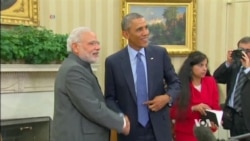President Barack Obama has arrived in India for a historic visit as the first American leader to attend the country’s Republic Day ceremony. White House officials say the visit, Obama’s second to India, marks a seminal and transformational moment in relations between the two countries.
India’s Republic Day celebration — a two-hour parade full of pomp and circumstance — marks the anniversary of the South Asian country's adoption of its constitution in 1950.
New Delhi resident Aditi Banga, who attends every year, said this year’s festivities would be unforgettable.
“The president of the U.S. is going to visit us," Banga said. "And we are very delighted and very indebted towards the United States of America that the president agreed to be our guest, and our guest forever.”
The level of security in New Delhi is unprecedented, with some 50,000 police and military personnel deployed throughout the Indian capital, thousands of closed-circuit television cameras installed and a no-fly zone set to be in place during Monday’s parade.
Obama will have a packed schedule while in New Delhi. On Sunday, he will lay a wreath at a memorial to Mahatma Gandhi before holding talks with Indian Prime Minister Narendra Modi.
Their talks will primarily focus on trade, but also take in security, nuclear power and climate change.
In the evening, he and first lady Michelle Obama will attend a state dinner at the presidential palace.
On Monday, in addition to attending the Republic Day celebration, the president will speak at a CEO forum bringing together American and Indian business leaders. Obama will cap his New Delhi visit Tuesday with a speech laying out his vision for the future of U.S.-India relations. He was also planning to visit the Taj Mahal on Tuesday but canceled that stop and will instead travel to Saudi Arabia.
Jawaharlal Nehru University professor Chintamani Mahapatra said the president's visit was symbolic of the regained momentum in the U.S.-India strategic dialogue.
"This is going to be a very important, significant milestone, both in symbolism and well as in substance," Mahapatra said. "The symbolism is that for the first time, a sitting president is visiting a country like India twice. For the first time, the leader of the oldest and most powerful democracy is coming to celebrate to democracy on (January) 26th Republic Day in India."
Obama's trip comes just four months after he welcomed Modi to the White House when the leaders of the world's largest democracies pledged to work together on issues such as boosting trade, countering climate change and fighting terrorism.
At that time, Obama praised the links between the United States and India. "We have so much in common, it is critical for us to continue to deepen and broaden the existing framework of partnership and friendship that already exists," he said.
In New Delhi, the symbolism of Obama's visit was not lost on Indian graduate student Chandra Sharma.
"As far as U.S.-India ties are related, it's a great step," Sharma said. "And we are looking forward, and we hope that President Obama is welcomed very well here and he has a very nice experience over here."
Obama has repeatedly said the U.S.-India relationship can be one of the defining partnerships of the 21st century, whether through trade, counterterrorism cooperation or maintaining a balance of power in Asia.
For many here in India, the American leader's visit is an important step toward that goal.






